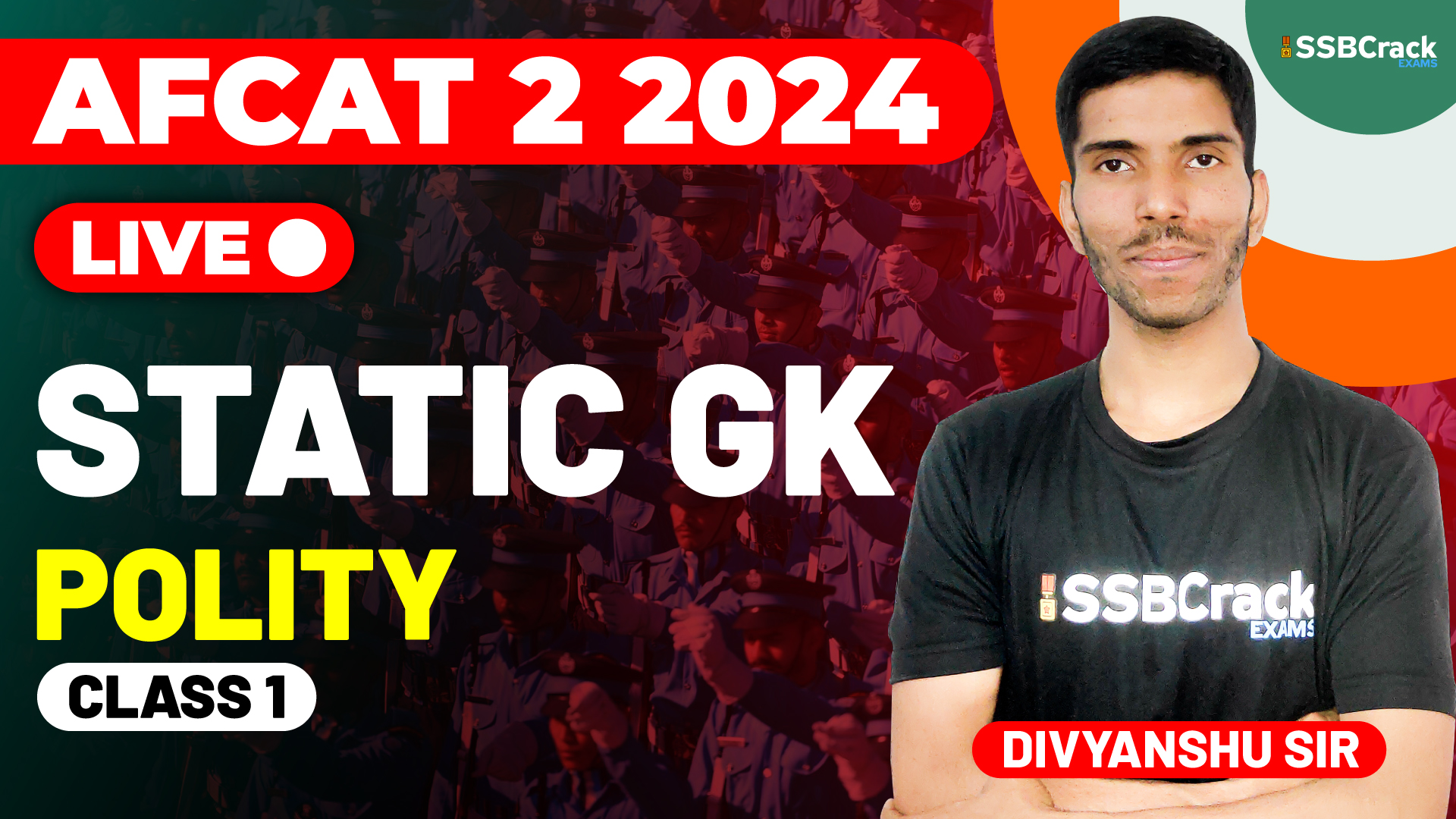Understanding the structure and functioning of the Indian political system is essential for aspirants of the AFCAT 2 2024 exam. Indian polity encompasses the framework of political institutions, processes, and principles that govern the country. This article provides an overview of the key components of Indian polity, including the Constitution, the structure of government, and important constitutional bodies.
AFCAT 2 2024 Exam Static GK Polity Class 1
The Constitution of India
Overview
The Constitution of India is the supreme law of the land, laying down the framework for political principles, procedures, and powers of government institutions. It was adopted on 26 November 1949 and came into effect on 26 January 1950.
Key Features
- Preamble: Declares India as a Sovereign, Socialist, Secular, and Democratic Republic, ensuring justice, liberty, equality, and fraternity for its citizens.
- Fundamental Rights: Guaranteed under Part III, these include rights such as the right to equality, freedom, and protection from discrimination.
- Directive Principles of State Policy: Guidelines for the state to ensure social and economic welfare, provided in Part IV.
- Fundamental Duties: Listed in Article 51A, these are moral obligations for citizens to promote a spirit of patriotism and uphold the unity of India.
Structure of Government
Union Government
The Executive
- President of India: The ceremonial head of state, elected indirectly by an Electoral College. Current President (as of 2024): Droupadi Murmu.
- Prime Minister: The head of government, leader of the majority party in the Lok Sabha. Current Prime Minister (as of 2024): Narendra Modi.
- Council of Ministers: Appointed by the President on the advice of the Prime Minister, responsible for executive functions.
The Legislature
- Parliament: Bicameral, consisting of the Lok Sabha (House of the People) and the Rajya Sabha (Council of States).
- Lok Sabha: Members elected directly by the people. The term is five years.
- Rajya Sabha: Members elected by state legislatures. It is a permanent body with one-third of members retiring every two years.
The Judiciary
- Supreme Court: The apex court of India, consisting of the Chief Justice and other judges. It has original, appellate, and advisory jurisdiction.
State Government
The Executive
- Governor: The ceremonial head of the state, appointed by the President.
- Chief Minister: The head of the government in each state, leader of the majority party in the state legislative assembly.
The Legislature
- State Legislature: Can be unicameral or bicameral, consisting of the Legislative Assembly (Vidhan Sabha) and, in some states, the Legislative Council (Vidhan Parishad).
The Judiciary
- High Courts: The highest judicial authority in each state, having original and appellate jurisdiction.
Constitutional Bodies
Election Commission of India
- Role: Conducts free and fair elections to the Parliament, State Legislatures, and the offices of the President and Vice-President.
- Composition: Chief Election Commissioner and other Election Commissioners.
Comptroller and Auditor General (CAG)
- Role: Audits the accounts of the central and state governments and public sector organizations.
- Appointment: Appointed by the President of India.
Union Public Service Commission (UPSC)
- Role: Conducts examinations for recruitment to various civil services and posts under the government.
- Composition: Chairman and other members appointed by the President.
Finance Commission
- Role: Recommends the distribution of financial resources between the central and state governments.
- Composition: Chairman and other members appointed by the President.
Important Constitutional Amendments
42nd Amendment (1976)
- Key Provisions: Added the terms “Socialist” and “Secular” to the Preamble, increased the power of the central government, and incorporated the Fundamental Duties.
44th Amendment (1978)
- Key Provisions: Restored the democratic rights taken away by the 42nd Amendment, including the right to property as a legal right instead of a fundamental right.
73rd and 74th Amendments (1992)
- Key Provisions: Strengthened local self-governance by instituting Panchayati Raj institutions and Municipalities, respectively.
Conclusion
A thorough understanding of Indian polity is crucial for AFCAT 2 2024 aspirants. The Constitution of India lays the foundation for the country’s political system, with its intricate framework of the executive, legislature, and judiciary ensuring the functioning of democracy. Familiarity with key constitutional bodies, significant amendments, and the structure of government at both the union and state levels will enhance your static GK knowledge and help you excel in the AFCAT 2 2024 exam.








